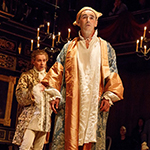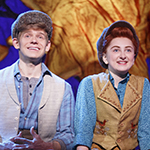Fiddler on the Roof
Paper Mill Playhouse, Millburn, NJ, December 15, 2023
Reviewed by Chip Deffaa
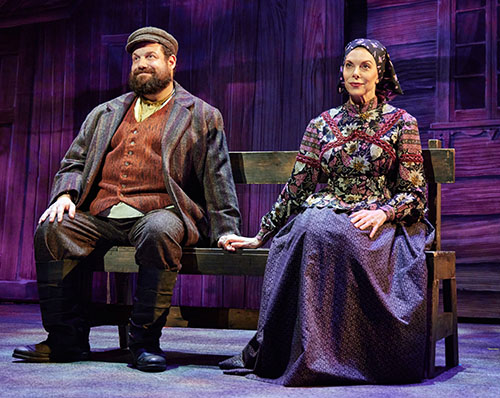
Photo: Jeremy Daniel
New Jersey’s Paper Mill Playhouse is currently presenting Fiddler on the Roof, which has not been seen on its stage in 40 years, through January 7, 2024. They could not have picked a better show for the holidays. This is one of the all-time great musicals, rich with heart. The book by Joseph Stein (based on the stories of Sholem Aleichem), the music by Jerry Bock, and the lyrics by Sheldon Harnick are all first-rate. Jerome Robbins’ choreography (reproduced here by Parker Esse) is iconic. The show is so unusually strong and well-constructed that even a halfway decent production will work its magic. I have seen many productions of Fiddler over the years; it’s one of my all-time favorite shows and it never fails to lift my spirits and open my heart.
While I have some definite reservations concerning Paper Mill’s production, there is so much to like about the show that I would recommend you get tickets if you can. It is a very good family show, and if you have kids, they will learn from it, not just be entertained. There are lots of rewards to be found here.
To begin, this production, directed by Mark S. Hoebee, looks terrific. The settings by Kelly James Tighe (based on the original scenic design by Michael Yeargan) are a treat to see. The score—which includes “Tradition,” “Matchmaker,” “If I were a Rich Man,” “Far from the Home I Love,” and “Anatevka”—is a succession of riches. (When the original Broadway production opened in 1964, I wore out my copy of the cast album; and “Sunrise Sunset,” which emerged from the score to become a surprise pop hit, was heard often back then on radio and TV.) Paper Mill is employing an appropriately large cast, and they get a great ensemble sound.
As for the story, we see Tevye, a dairyman in a small Jewish village in Russia in 1905, dealing with challenges that range from daughters who want to marry husbands of their own choice (rather than accept traditional arranged marriages) to pogroms that are making life in their homeland impossible.
When Fiddler on the Roof ended its original Broadway run, it held the record as the longest-running musical in Broadway history up until then. There’s a reason this musical is so enduringly popular. The show feels timeless and universal. The story that so effectively mixes joy and sorrow touches and resonates with us.
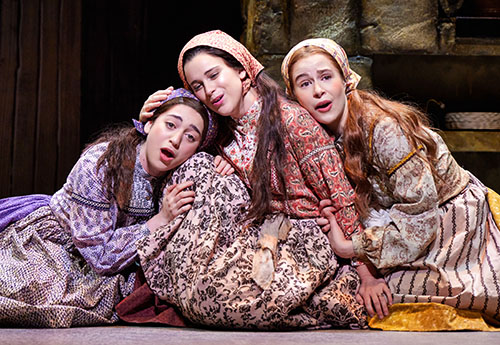
Austen Danielle Bohmer (Hodel)
Photo: Jeremy Daniel
There is so much to love about Fiddler, generally, I almost feel like a Grinch to bring up this production’s shortcomings, but I have to be honest here. Tevye is one of the great roles in the musical-theater canon. It is a complex and demanding role. Not every actor is up to its challenges, just as not every actor can play King Lear. It is a starring role, and for Fiddler to have maximum impact, the actor cast as Tevye has to deliver a star performance from the moment he walks onto the stage. I think back to some of the memorable portrayals of Tevye I’ve seen in stage productions over the years. Harvey Fierstein, Theodore Bikel, and Topol were clearly stars. From their first words as Tevye they commanded the stage; they had presence, and they compelled our attention. They demanded we care about the things that they cared about, and we willingly complied. I’ve seen other actors play Tevye—from Eddie Mekka at Bucks County Playhouse to Michael Caizzi at Hofstra University—who weren’t quite at that level but still performed with such confidence and brio and with such good instincts as to what to emphasize and what to throw away that they carried the show wonderfully.
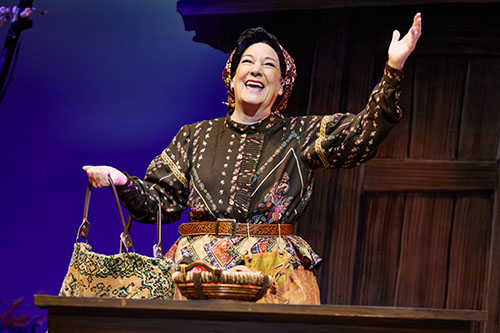
Photo: Jeremy Daniel
Jordan Gelbert, cast as Tevye in this production, seemed like a pleasant enough fellow here, just as he always has in his roles, whether I’ve seen him on stage in New York (going back to Avenue Q) or at Paper Mill (Holiday Inn), or on TV (Elementary, Law and Order: SVU). He made an agreeable Tevye, but he gave a workmanlike, journeyman-type performance—mild, amiable, likeable. Ideally, audience members should feel from the start that they’re in the presence of a star. That’s just didn’t happen here, and the show had less impact as a result.
The role of Tevye requires a greater emotional range than Gelbert displayed. We have to believe Tevye when he is bellowing and blustering; we have to feel his strength, even in the comical scenes. We also have to feel and believe his vulnerability in the darker moments of the play (as when the Russians wreak havoc at his daughter’s wedding). This production lost some of its tension because Gelbert generally seemed like such a nice, inoffensive character.
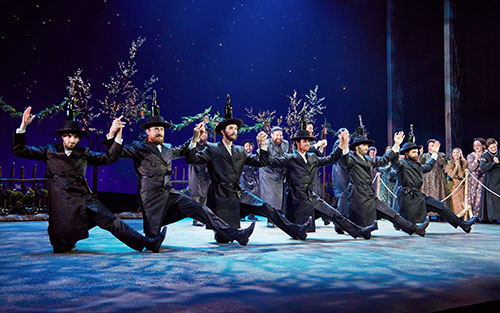
Photo: Jeremy Daniel
We have to believe that Tevye is so strongly attached to his traditions that he just might forever cut off his daughter who chooses to marry outside the faith and chooses to marry a Russian. But Gelbert seemed so malleable from the start, we suspected that any of his daughters (or his wife) could have easily wrapped him around their fingers and got him to do “the right thing.” The show would work much better if there was more tension—if we felt that Tevye was being forced to make decisions that were really difficult for him. I didn’t feel that here.
Gelbert sometimes spoke in a loud voice and sometimes quietlt, but his choices seemed studied, rather than natural. He should be a larger-than-life character with big emotions naturally spilling out of him. I saw this production fairly early in its run. Maybe Gelbert will take greater ownership of the role as the run progresses. I hope so. If he can give a bigger, more commanding and varied performance, the show will be stronger for it. I found him easy to like, but to me, some of the supporting players—Jill Abramovitz as Goldi (Tevye’s wife) and Suzanne Grodner as Yente (the matchmaker)—I enjoyed very much. They were at least as strong and at least as interesting as Gelbert.


